Related Research Articles
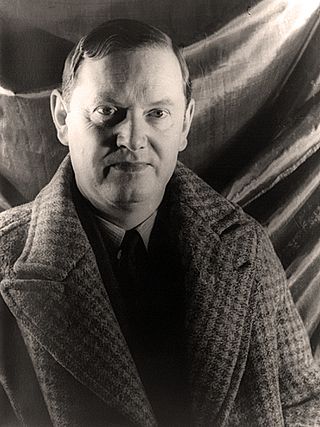
Arthur Evelyn St. John Waugh was an English writer of novels, biographies, and travel books; he was also a prolific journalist and book reviewer. His most famous works include the early satires Decline and Fall (1928) and A Handful of Dust (1934), the novel Brideshead Revisited (1945), and the Second World War trilogy Sword of Honour (1952–1961). He is recognised as one of the great prose stylists of the English language in the 20th century.
The Heart of the Matter (1948) is a novel by English author Graham Greene. The book details a life-changing moral crisis for Henry Scobie. Greene, a former British intelligence officer in Freetown, British Sierra Leone, drew on his experience there. Although Freetown is not mentioned in the novel, Greene confirms the location in his 1980 memoir, Ways of Escape.

Brideshead Revisited: The Sacred & Profane Memories of Captain Charles Ryder is a novel by the English writer Evelyn Waugh, first published in 1945. It follows, from the 1920s to the early 1940s, the life and romances Charles Ryder, especially his friendship with the Flytes, a family of wealthy English Catholics who live in a palatial mansion, Brideshead Castle. Ryder has relationships with two of the Flytes: Sebastian and Julia. The novel explores themes including Catholicism and nostalgia for the age of English aristocracy. A well-received television adaptation of the novel was produced in an 11-part miniseries by Granada Television in 1981.

Mrs. Dalloway is a novel by Virginia Woolf published on 14 May 1925. It details a day in the life of Clarissa Dalloway, a fictional upper-class woman in post-First World War England. It is one of Woolf's best-known novels.
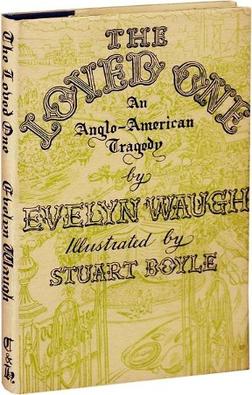
The Loved One: An Anglo-American Tragedy (1948) is a short satirical novel by British novelist Evelyn Waugh about the funeral business in Los Angeles, the British expatriate community in Hollywood, and the film industry.

William Francis Deedes, Baron Deedes, was a British Conservative politician, army officer and journalist. He was the first person in Britain to have been both a member of the Cabinet and the editor of a major daily newspaper, The Daily Telegraph.
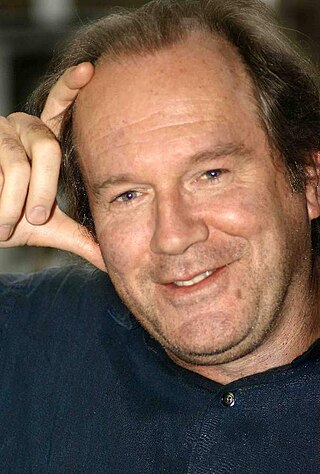
William Andrew Murray Boyd is a Scottish novelist, short story writer and screenwriter.

A Handful of Dust is a novel by the British writer Evelyn Waugh. First published in 1934, it is often grouped with the author's early, satirical comic novels for which he became famous in the pre–World War II years. Commentators have, however, drawn attention to its serious undertones, and have regarded it as a transitional work pointing towards Waugh's Catholic postwar fiction.
A boot is a type of footwear.
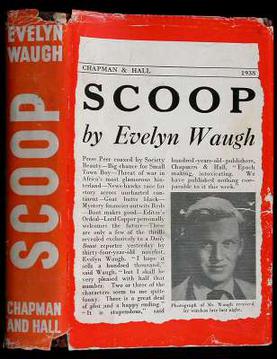
Scoop is a 1938 novel by the English writer Evelyn Waugh. It is a satire of sensationalist journalism and foreign correspondents.

Bright Young Things is a 2003 British drama film written and directed by Stephen Fry. The screenplay, based on the 1930 novel Vile Bodies by Evelyn Waugh, provides satirical social commentary about the Bright Young People—young and carefree London aristocrats and bohemians—as well as society in general, in the interwar era.
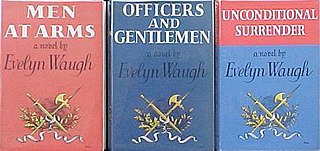
The Sword of Honour is a trilogy of novels by Evelyn Waugh which loosely parallel Waugh's experiences during the Second World War. Published by Chapman & Hall from 1952 to 1961, the novels are: Men at Arms (1952); Officers and Gentlemen (1955); and Unconditional Surrender (1961), marketed as The End of the Battle in the United States and Canada.
Tuckerization is the act of using a person's name in an original story as an in-joke. The term is derived from Wilson Tucker, a pioneering American science fiction writer, fan and fanzine editor, who made a practice of using his friends' names for minor characters in his stories. For example, Tucker named a character after Lee Hoffman in his novel The Long Loud Silence, and after Walt Willis in Wild Talent.
A war novel or military fiction is a novel about war. It is a novel in which the primary action takes place on a battlefield, or in a civilian setting, where the characters are preoccupied with the preparations for, suffering the effects of, or recovering from war. Many war novels are historical novels.
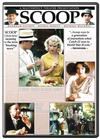
Scoop is a 1987 television film directed by Gavin Millar, adapted by William Boyd from the 1938 satirical novel Scoop by Evelyn Waugh. It was produced by Sue Birtwistle with executive producers Nick Elliott and Patrick Garland. Original music was made by Stanley Myers. The story is about a reporter sent to the fictional African state of Ishmaelia by accident.
Christopher Hugh Sykes was an English writer. Born into the northern English landowning Sykes family of Sledmere, he was the second son of the diplomat Sir Mark Sykes (1879–1919), and his wife, Edith. His sister was Angela Sykes, the sculptor. His politician uncle, also Christopher Sykes, was, for a time, a close friend of Edward VII.

Officers and Gentlemen is a 1955 novel by the British novelist Evelyn Waugh.

A Good Man in Africa is William Boyd's first novel, published in 1981. It won both the Whitbread Book Award for a first novel and the Somerset Maugham Award that year.
William Boot is a fictional journalist who is the protagonist in the 1938 Evelyn Waugh comic novel Scoop.
A Tourist in Africa is a travel book by the British writer Evelyn Waugh. It appeared in 1960, many years after his travel writings of the 1930s.